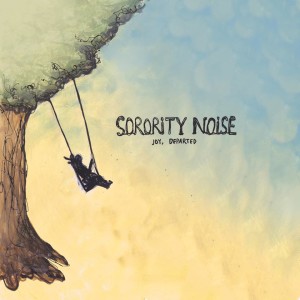On the morning of July 30th 2015, Sorority Noise frontman Cameron Boucher was crying uncontrollably. He was unable to move. He felt hopeless. Unfortunately, these feelings are commonplace for Boucher as he’s been diagnosed with manic depression.
Hours later he would take the stage with his three bandmates- guitarist Adam Ackerman, bassist Ryan McKenna, and drummer Charlie Singer- as the opening act for Motion City Soundtrack’s “Commit This to Memory 10-Year-Anniversary Tour.”
It is on the stage, channeling his introspections through song, where Boucher achieves some level of serenity. Enough to remind himself that life is worth living and that he has the power to suppress his demons.
Boucher’s struggles are chronicled in his band’s latest album, their sophomore effort “Joy, Departed” which was released via Topshelf Records in June. The album consists of a plethora of musical stylings ranging from Weezer-esque emo-pop (the devilishly catchy “Art School Wannabe”), whispered, semi-orchestral (the dreamy “Fuschia”) and slow-building post-rock that bursts at its climax (“Your Soft Blood”).
“Joy, Departed” is a massive leap from their relatively straightforward, yet stellar, 2014 debut “Forgettable,” which was written entirely by Boucher. A lineup change and a different approach to the writing/recording process resulted in the refreshingly vast ground that “Joy, Departed” covers sonically.
“We changed out the drummer and the bassist, and in my opinion the rhythm section is the most important part of the band. With a new rhythm section you create an entirely new vibe,” Boucher said.
He and his bandmates were crowded around a loading dock in the back of Waterstreet Music Hall in Rochester, NY roughly 30 minutes before they performed. Boucher, who started off the interview relatively tense, had begun to smile and laugh with his bandmates as they humbly and thoughtfully responded between inside jokes and lighthearted banter.
“We went from a math, punky-minded rhythm section to a post-rock rhythm section,” Ackerman said. “These guys all come from an ambient, post-rock background. I don’t really do that so it was kinda fun [doing] something I had never really done before,” the self-proclaimed Van Halen fan continued.
The post-rock influence on “Joy, Departed” is apparent right from the start as the gentle, orchestral, and keyboard-laden opener “Blissth” grows from a breezy rustle to a full-band, vocally layered emo-rocker in just over three minutes. This basic formula is employed once again in “Fluorescent Black” and the powerfully unsettling closer “When I See You (Timberwolf),”in which Boucher recounts a friend struggling with addiction.
However, the achingly tense “Your Soft Blood” is both the best song on the album and of the band’s career. Boucher candidly measures his self-worth and defines himself by his flaws as the song murmurs and uneasily totters along before boiling over into the fiercest, distorted riff the band has ever produced. The razor-sharp dynamics are genuinely chilling in a way that can only be compared to Brand New’s legendary “Limousine,” which is a sound that countless bands have tirelessly, yet unsuccessfully attempted to replicate for nearly a decade. Sorority Noise got it right.
But amidst the post-rock grandeur is an entirely different form of instrumentation. That is, the side of Sorority Noise with a soft spot for Weezer rather than Brand New.
“There can be really dark lyrics behind a really poppy thing or dark lyrics behind a really dark thing,” Boucher said in regards to how his songs take form.
“When we write stuff we don’t ever really write a song with a certain direction in mind. All the songs we’ve written have really kind of shaped themselves,” Ackerman Said.
Often times, albums with such variation as “Joy, Departed” can be awkwardly inconsistent and uneven to the ear. However, Sorority Noise successfully balanced their punkier tracks with their ambient ones in a way that logistically shouldn’t work, but does.
The rockin’ earworm “Art School Wannabe” immediately follows “Your Soft Blood,” but the bouncy power-chords, sing-song vocals and shred-fest guitar solo inexplicably feel at home alongside the rainstorm that is the previous track.
Much of this consistency is due to Boucher’s impressively frank lyricism that appears on every song. Lines such as “what does it mean to be happy/and am I getting better/I used to make excuses for myself but it’s not the weather” in “Mononokay” and “maybe I’m my own greatest fear/maybe I’m just scared to admit that/I might not be as dark as I think” in “Art School Wannabe” are just a sampling of Boucher’s relentless self-criticism.
“I try to be very honest lyrically and don’t try to cut any corners or dazzle them up to sound more interesting,” Boucher said.
His favorite track on the album is the grungy “Using” which directly narrates his struggle with addiction in trying to cope with manic depression.
“I like ‘Using’ a lot because every time we play that I get to talk about having manic depression. Every night I try to tell people to make sure that they know they’re worth it and that we don’t need to bastardize sadness anymore. You don’t need to be a sadboy ‘cause there’s a lot of people struggling from that and you’re not allowing them to truly find themselves and be open with who they are and realize that they do have a mental illness. It’s not a joke. It’s not fun. It’s a thing you have to deal with every day of your life- some days much worse than others. I think that song is really nice to play live ‘cause I get to talk about shit I’ve been through,” Boucher explained.
As the band finished their set that night with an immaculate play-through of “Your Soft Blood,” the visibly shaken Boucher was met with hugs and heartfelt words from his bandmates before they even exited the stage. Moments before, Boucher uttered the lyrics “define me with long hair and cigarettes/don’t chalk me up to anything less than sin” and proceeded to, seemingly uncontrollably, thrash himself around stage as the song broke down before collapsing into a heap beside his pedal board.
When a band is able to incorporate such rawness into their music and display such authenticity during their performance that they leave listeners with pits in their stomachs, that band is special.
Sorority Noise are young, but they’ve already achieved a level of mastery in their aesthetic that most bands take years to attain.
“Joy, Departed” is essentially a manifestation of Boucher’s manic tendencies in that one second it’s up (“Art School Wannabe”) and the next it’s down (“Your Soft Blood”). Though, ultimately it’s all one in the same. It just depends how you choose to see it.
-Eli Enis






More Stories
Knocked Loose’s “Don’t Reach For Me” has entered Spotify’s USA Viral 50 chart
An underrated Deftones song from ‘Saturday Night Wrist’ is getting more attention, thanks to their Coachella performances
Bad Valentine unveils debut music video “HAUNTING ME” – A captivating dive into guilt and redemption